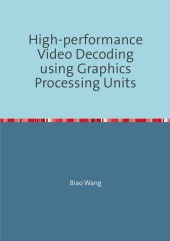 Neuerscheinungen 2018Stand: 2020-02-01 |
Schnellsuche
ISBN/Stichwort/Autor
|
Herderstra▀e 10
10625 Berlin
Tel.: 030 315 714 16
Fax 030 315 714 14
info@buchspektrum.de |

Biao Wang
High-performance Video Decoding using Graphics Processing Units
2018. 176 S. 297 mm
Verlag/Jahr: EPUBLI 2018
ISBN: 3-7467-3100-3 (3746731003)
Neue ISBN: 978-3-7467-3100-1 (9783746731001)
Preis und Lieferzeit: Bitte klicken
The book describes how the Graphics Processing Units (GPUs) can be used to accelerate video decoding applications.
The increasing demand of decoding high-quality videos can lead to a challenging com-
putational requirement for conventional Central Processing Unit (CPU) architectures.
Graphics Processing Units (GPUs) in general provide higher computational power
than CPUs. Efficient GPU execution, however, requires massive parallelism and little ex-
ecuting divergence, two criteria are not fully met by all video decoding kernels. This thesis
exploits how GPUs can be effectively used in video decoding applications. The challenges
include proper workload distribution between the CPU and GPU, task optimizations on
two heterogeneous devices, and efficient communication between them.
A complete parallel HEVC decoder was proposed for heterogeneous CPU+GPU
systems. We exploited available decoding parallelism on the CPU, GPU, and between the
two devices simultaneously. On top of the parallel design, two workload balancing schemes
were implemented, in order to adapt computation resource variation on CPU and GPU.
In addition, an energy measurement module was developed for energy efficiency analysis.
Evaluated results showed that suitable decoding kernels can be accelerated substan-
tially (up to 28.2×) on GPUs at the kernel level. At the application level, using GPU
architecture can provide significant acceleration when only a low number (1 to 8) of CPU
cores are available. On a system consisting of an NVIDIA Titan X Maxwell GPU and an
Intel Xeon E5-2699v3 CPU, with four CPU cores, the proposed HEVC decoder delivers
167 frames per second for 4K videos, corresponding to a speedup of 2.2× over the state-
of-the-art CPU decoder using four CPU cores. When more CPU cores (8) are employed,
the benefit of using GPU vanishes and the performance is eventually outperformed by the
CPU decoder due to GPU overloading. With respect to energy, because of its high power
consumption GPU architecture is not as efficient as the CPU for HEVC decoding.
Wang, Biao
Biao Wang received the M.S. degree in Computer Application Technology in July 2010 and Bachelor degree in Computer Software Technology in July 2007, both from University of Electronic Science and Technology of China (UESTC), ChengDu, China. Since Oct 2010, he joined the Embedded Systems Architecture as a PhD student with scholarship from China Scholarship Council (CSC). His research is focused on video decoding using Graphic Processing Units (GPUs). He is experienced in high performance video decoding on heterogeneous systems with CPU and GPU. Some of these works are published in international conferences and prestigious journals.


